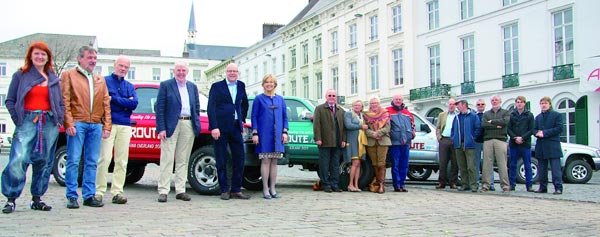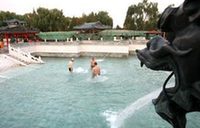Following flaxen threads
 |
|
The Belgian business group set out from Brussels for a Silk Road odyssey. [Photo provided to China Daily] |
Trekking the old Silk Road, a modern team of Belgians retraced the centuries-old footsteps of their linen-trading forebears, hoping that the prosperity they once found can be revived in today's global economy. Martin Banks reports.
|
|
It may not be the Yellow Brick Road but, like Dorothy in the Wizard of Oz, the old Silk Road has got people in Belgium and China dreaming. They are hoping the route once trodden by Flemish traders can again help promote closer economic ties between Asia and Europe.
A group of Belgian executives has just returned from the trip of a lifetime, retracing the steps once taken by flax and linen traders from the Low Countries.
Traveling by road from Harelbeke and Mechelen, just north of Brussels, they journeyed to Chengdu in China's Sichuan province and then to Suzhou, Jiangsu province, roughly 20,000 kilometers. The 18-strong group was not taking flax in return for silks and spices, though.
The marathon trek through Central Asia was the idea of Dirk Vyncke, chairman of a Flemish company selling energy installations.
"This was not a trade mission," he says. "Nor were we tourists or adventurers. We went to listen to people and exchange ideas on how we can prepare a better future for our children and grandchildren. The world is, more than ever, a global village where we all are interconnected and dependent on each other."
Bob Elsen, 66, another member of the team, says it was the "magical attraction" of the Silk Road that initially drew him to the trip. Elsen is the managing director of the Mechelen-based travel company Joker that recently opened a travel cafe in Chengdu.
"It is the route where goods, ideas and even philosophies have been traded since time immemorial as great civilizations rose and fell," he says.
"Putting the idea into practice was not easy. There were wild stories about the Caucasus, Central Asia and western China, but putting those areas under the cultural and economic microscope with a group of businesspeople was a story I wasn't going to miss."
Vyncke believes we have to find a "better system" for global trade and relations and "the answer can't be found in books. It is time for responsible global citizens everywhere to listen respectfully to each other, to learn from each other and to think up new solutions."
















